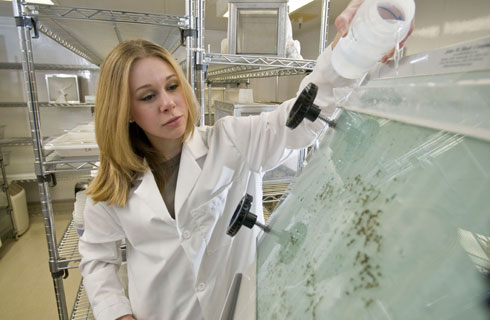University receives $1.4 million science education award from Howard Hughes Medical Institute to support innovate undergraduate science education

Virginia Tech was among 50 top research universities nationwide to receive a Precollege and Undergraduate Science Education Program award from the Howard Hughes Medical Institute (HHMI) that will be used to encourage university faculty to develop new ways to teach and inspire undergraduate students about science and research.
The $1.4 million award given to Virginia Tech — the university’s first education award from HHMI — was among $70 million in grants given by Howard Hughes Medical Institute this summer. HHMI invited 197 research-focused universities to apply for the science education grants.
“HHMI is committed to funding education programs that excite students’ interest in science,” says HHMI President Robert Tjian. “We hope that these programs will shape the way students look at the world — whether those students ultimately choose to pursue a career in science or not.”
“Today, at research universities across the nation, few students are being trained to use the interdisciplinary strategies needed to confront today’s most important scientific problems,” said Virginia Tech Senior Vice President and Provost Mark McNamee. “With this grant, we hope to break down the separation of basic and applied research, particularly between engineering and life sciences, and help undergraduate students acquire the knowledge and skills they will need to address the scientific challenges of the future.”
Under the leadership of Vice President and Dean for Undergraduate Education Daniel Wubah, Virginia Tech is developing a “scieneering” minor that will unite all sciences with engineering. Students who pursue the minor will take courses in departments outside their major and participate in seminars exploring topics at the interface of science and engineering.
“They will also be required to complete their capstone research project in a laboratory outside their major discipline,” said Wubah. “That means a biology major will need to do their research in an engineering lab and an engineering major will go to a chemistry, biology, or physics lab.”
The scieneering program is Virginia Tech’s first step toward developing an interdisciplinary undergraduate biomedical engineering program, building on a successful biomedical engineering graduate program already on campus.
“The idea is to do something innovative for the students to prepare them for the challenges they will face in their future careers,” says Wubah. “It has been a goal of the administration to increase the number of students who get research experiences. That has been successful, but support of the scieneering program will take us to the next level.”
Jill Sible, associate professor of biological sciences and associate dean for curriculum, instruction, and advising in the College of Science (coordinator of the science programs); Bev Watford, professor in interim head, Department of Engineering Education and director of the Center for Enhancement of Engineering Diversity in the College of Engineering (coordinator of the engineering programs); and Erin Dolan, associate professor of biochemistry (coordinator of the pre-college programs) will serve as co-principal investigators on the project.
HHMI, the nation’s largest private funder of science education, has spent $1.6 billion since 1985 to reform life sciences education from elementary through graduate school. The Precollege and Undergraduate Science Education Program allow large research universities to tackle projects that affect hundreds or even thousands of students, both inside the university and at local K-12 schools.
“By selecting these 50 grantees, we highlight areas and approaches that we think are particularly powerful,” says David Asai, director of HHMI’s precollege and undergraduate programs. “We hope that universities across the country — even those that are not HHMI grantees — will turn to these programs when they think about improving science education.”
Dedicated to its motto, Ut Prosim (That I May Serve), Virginia Tech takes a hands-on, engaging approach to education, preparing scholars to be leaders in their fields and communities. As the commonwealth’s most comprehensive university and its leading research institution, Virginia Tech offers 240 undergraduate and graduate degree programs to more than 31,000 students and manages a research portfolio of $513 million. The university fulfills its land-grant mission of transforming knowledge to practice through technological leadership and by fueling economic growth and job creation locally, regionally, and across Virginia.




